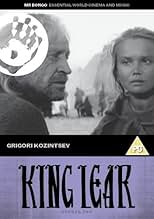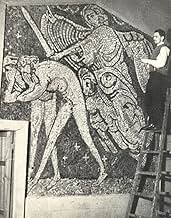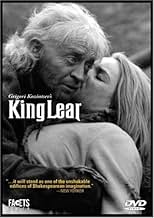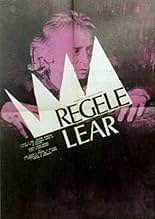CALIFICACIÓN DE IMDb
8.0/10
1.8 k
TU CALIFICACIÓN
Adaptación soviética de una tragedia mundialmente conocida sobre un rey anciano y la cruel pérdida de sus ilusiones.Adaptación soviética de una tragedia mundialmente conocida sobre un rey anciano y la cruel pérdida de sus ilusiones.Adaptación soviética de una tragedia mundialmente conocida sobre un rey anciano y la cruel pérdida de sus ilusiones.
- Dirección
- Guionistas
- Elenco
- Premios
- 2 nominaciones en total
Jüri Järvet
- King Lear
- (as Yuri Yarvet)
Elza Radzina
- Goneril
- (as E. Radzina)
Galina Volchek
- Regan
- (as G. Volchek)
Valentina Shendrikova
- Cordelia
- (as V. Shendrikova)
Karlis Sebris
- Gloster
- (as K. Sebris)
Leonhard Merzin
- Edgar
- (as L. Merzin)
Regimantas Adomaitis
- Edmund
- (as R. Adomaytis)
Vladimir Emelyanov
- Kent
- (as V. Yemelyanov)
Aleksandr Vokach
- Cornwall
- (as A. Vokach)
Donatas Banionis
- Albany
- (as D. Banionis)
Aleksey Petrenko
- Oswald
- (as A. Petrenko)
Juozas Budraitis
- King of France
- (as I. Budraytis)
Opiniones destacadas
This version of King Lear is an incredible achievement due to the masterful adaptation from the Shakespeare original by one of the best Russian poets, writers, and translators of the last century, Boris Pasternak; elegant and powerful images by the cinematographer Jonas Gritsius (he also worked with Grigori Kozintsev on the earlier Shakespeare's adaptation, "Hamlet", 1964), the music of Dimity Shostakovich, and the great performances from all actors.
Estonian actor Jüri Järvet is masterful as the mad king in a performance which is reminiscent of Kinski as another brilliant madman - Aguirre. They were even the same age when they played Aguirre and Lear. The whole cast is amazing: Kozintsev chose the best actors possible for his project and everyone delivers. I'd like to mention Oleg Dal as the touching Fool; Karl Sebris as the Duke of Gloucester, whose scenes with his son Edgar after having been blinded are very moving; Regimantas Adomaitis as Edmund, a treacherous son and brother but a brilliant man; and Donatas Banionis (who played the main character in Tarkovsky's Solaris) as an intelligent and noble Albany. But like I said, everyone and everything is just perfect in this little known but IMO, the Best adaptation of the beloved and one of the most wrenching tragedies in the English and in the world literature.
Estonian actor Jüri Järvet is masterful as the mad king in a performance which is reminiscent of Kinski as another brilliant madman - Aguirre. They were even the same age when they played Aguirre and Lear. The whole cast is amazing: Kozintsev chose the best actors possible for his project and everyone delivers. I'd like to mention Oleg Dal as the touching Fool; Karl Sebris as the Duke of Gloucester, whose scenes with his son Edgar after having been blinded are very moving; Regimantas Adomaitis as Edmund, a treacherous son and brother but a brilliant man; and Donatas Banionis (who played the main character in Tarkovsky's Solaris) as an intelligent and noble Albany. But like I said, everyone and everything is just perfect in this little known but IMO, the Best adaptation of the beloved and one of the most wrenching tragedies in the English and in the world literature.
Even, relaxed performances. Tasteful, non-intrusive direction. No gimmicks. And finally a clear, even obvious! result.
This might seem like damning with faint praise, except that Kozintsev has done what Brook didn't, what Olivier's BBC production didn't, and what every stage production I have ever seen resolutely and spectacularly failed to do. That is to create order and clarity and meaning within arguably the greatest and arguably the most difficult play ever written. It seems easy to do in Kosintsev's version, which is one of his great triumphs. see it
This might seem like damning with faint praise, except that Kozintsev has done what Brook didn't, what Olivier's BBC production didn't, and what every stage production I have ever seen resolutely and spectacularly failed to do. That is to create order and clarity and meaning within arguably the greatest and arguably the most difficult play ever written. It seems easy to do in Kosintsev's version, which is one of his great triumphs. see it
10yavigad
Just finished watching the the 1971 version of Griogiri Kozintsev's King Lear and felt compelled to write my first ever IMDb review to recommend it to anyone who has the opportunity to see it. It was like stumbling across a rare treasure where not expecting it, and I just can't keep my mouth shut. I hadn't heard of the movie before and was doubtful about watching a dubbed version. This proved to be less of a distraction than I expected, and afforded me the opportunity of concentrating on the characterizations and visuals. It was an amazing interpretation of Shakespeare that brought to life the tragedy of Lear through sweeping scenery,breathtaking cinematography and Shakespearean acting as as good as any I've ever seen. I found the VERY Russian style invigorating after having watched countless BBC versions of Shakespeare. Not only did I get a greater appreciation for the original play, but by the last haunting scene I felt privileged to have watched a towering cinematic creation.
Just like in "Ran" (1985, Kurosawa) Kozintsev uses a barren landscape to illustratie the psychological wasteland of Lear. He don't need colors to do so, but the result is at least as convincing. It must be said however that Kozintsev had a "dreamteam" to his dispoasal. Which director can say that he has a Nobel prize winner (Boris Pasternak) as script writer? Also the music is taken care of by a famous classical componist (Dmitri Shostakovich). In Russian filmmaking the collaboration between directors and famous componists seems te be more common then in the West. Take for example the collaboration between Sergeij Eisenstein and Sergeij Prokofiev.
There are two ways of adapting Shakespeare, literally and transposing the story to modern times. An example of the last approach to "King Lear" is "Broken lance" (1954, Edward Dmytryk) in which the story is situated in a businessfamily. I prefer staying close to the original, and that is the approach chosen by Kozintsev.
In the English language there is a difference between a real fool (buffoon) and someone who is only acting as a fool, but in fact knows better what is going on than everybody else (jester). In "Karol Lir" the jester plays a prominent role. Keep a close look at this character while watching the film.
There are two ways of adapting Shakespeare, literally and transposing the story to modern times. An example of the last approach to "King Lear" is "Broken lance" (1954, Edward Dmytryk) in which the story is situated in a businessfamily. I prefer staying close to the original, and that is the approach chosen by Kozintsev.
In the English language there is a difference between a real fool (buffoon) and someone who is only acting as a fool, but in fact knows better what is going on than everybody else (jester). In "Karol Lir" the jester plays a prominent role. Keep a close look at this character while watching the film.
Just as Beethoven's late piano sonatas and string quartets represent the Everest for musicians so Shakespeare's monumental roles of Hamlet, Othello, Coriolanus, Macbeth and King Lear present the ultimate challenge to those actors brave enough, and fit enough, to take them on.
The play 'King Lear' makes no concessions to the spectator and its cruelty, misery and dark despair are unrelenting. Not for the squeamish certainly.
The 'Hamlet' directed by Grigori Kozintsev in 1964 is universally considered the greatest Shakespearean film adaptation whereas opinions of his 'Lear' are more sharply divided.
Lear is played by Yuri Yarvet, an Estonian whose voice is dubbed and whose portrayal is that of an irascible and querulous old man with nothing of the 'King' about him at all but that is evidently the way the director wanted it. One cannot fail however to be impressed by his performance as a father driven to distraction by the realisation that none of his three daughters loves him. We know of course that his favourite daughter Cordelia has never ceased to love him but this he discovers all too late. Valentina Shendrikova is simply stunning as Cordelia as are Galina Volchek as Regan and Elsa Radzina as Goneril who had previously impressed as Gertude in 'Hamlet'.
The whole cast is uniformly excellent and Kozintsev has again benefited from the stunning images of cinematographer Jonas Gritsius and a powerful score by Shostakovich which is especially impressive in the storm sequence.
English speaking Bardolators will obviously regret the abridged text and the loss of the glorious verse but Nobel Laureate Boris Pasternak has done a wonderful job here in realising the director's vision of a fragile society on the verge of collapse. Michael Pennington likened watching 'Lear' to being cast adrift and looking for help. It is all so grim that when Albany tells Goneril :"You are not worth the dust which the rude wind blows in your face" one wants to stand up and cheer!
Shakespeare was a renowned adaptor and he has here taken an Elizabethan melodrama entitled 'King Leir' and given us a searing Jacobean tragedy. In the original Cordelia is spared and Leir regains his throne but here Cordelia's murder and her father's death are the final hammer blows and it is little wonder that Samuel Johnson found the ending almost unbearable.
The only two left standing are Albany and Edgar so there is at least a glimmer of hope. Ben Jonson declared that " Shakespeare is for all the ages" and Lear's observation that "when we are born we cry that we are come into this great stage of fools" just about sums up the human condition.
The play 'King Lear' makes no concessions to the spectator and its cruelty, misery and dark despair are unrelenting. Not for the squeamish certainly.
The 'Hamlet' directed by Grigori Kozintsev in 1964 is universally considered the greatest Shakespearean film adaptation whereas opinions of his 'Lear' are more sharply divided.
Lear is played by Yuri Yarvet, an Estonian whose voice is dubbed and whose portrayal is that of an irascible and querulous old man with nothing of the 'King' about him at all but that is evidently the way the director wanted it. One cannot fail however to be impressed by his performance as a father driven to distraction by the realisation that none of his three daughters loves him. We know of course that his favourite daughter Cordelia has never ceased to love him but this he discovers all too late. Valentina Shendrikova is simply stunning as Cordelia as are Galina Volchek as Regan and Elsa Radzina as Goneril who had previously impressed as Gertude in 'Hamlet'.
The whole cast is uniformly excellent and Kozintsev has again benefited from the stunning images of cinematographer Jonas Gritsius and a powerful score by Shostakovich which is especially impressive in the storm sequence.
English speaking Bardolators will obviously regret the abridged text and the loss of the glorious verse but Nobel Laureate Boris Pasternak has done a wonderful job here in realising the director's vision of a fragile society on the verge of collapse. Michael Pennington likened watching 'Lear' to being cast adrift and looking for help. It is all so grim that when Albany tells Goneril :"You are not worth the dust which the rude wind blows in your face" one wants to stand up and cheer!
Shakespeare was a renowned adaptor and he has here taken an Elizabethan melodrama entitled 'King Leir' and given us a searing Jacobean tragedy. In the original Cordelia is spared and Leir regains his throne but here Cordelia's murder and her father's death are the final hammer blows and it is little wonder that Samuel Johnson found the ending almost unbearable.
The only two left standing are Albany and Edgar so there is at least a glimmer of hope. Ben Jonson declared that " Shakespeare is for all the ages" and Lear's observation that "when we are born we cry that we are come into this great stage of fools" just about sums up the human condition.
¿Sabías que…?
- TriviaGrigoriy Kozintsev made this version of the play at the same time that Peter Brook was filming King Lear (1970), and the two directors corresponded with each other throughout shooting.
- ConexionesFeatured in King Lear (1987)
Selecciones populares
Inicia sesión para calificar y agrega a la lista de videos para obtener recomendaciones personalizadas
Detalles
- Tiempo de ejecución2 horas 20 minutos
- Color
- Mezcla de sonido
- Relación de aspecto
- 2.35 : 1
Contribuir a esta página
Sugiere una edición o agrega el contenido que falta

Principales brechas de datos
By what name was King Lear (1970) officially released in Canada in English?
Responda

































